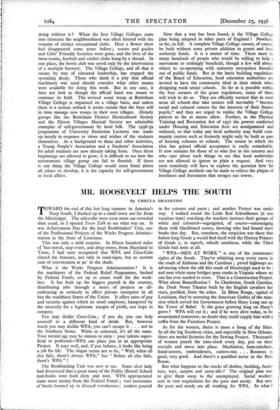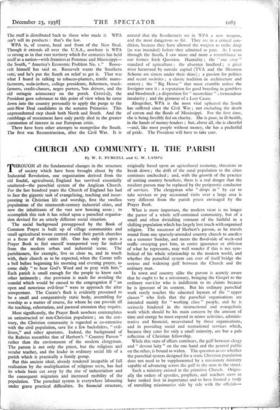MR. ROOSEVELT HELPS THE SOUTH
By URSULA BRANSTON
TOWARD the end of this last long summer in America's Deep South, I fetched up in a small town not far from the Mississippi. The sidewalks were even more car-crowded than usual, so I opened Town Talk to see what was on. It was Achievement Day for the local Bookbinders' Unit, one of the Professional Projects of the Works Progress Adminis- tration in the State of Louisiana.
This was only a mild surprise. In fifteen hundred miles of 'bus-travel, stop-overs, and drug-stores, from Maryland to Texas, I had soon recognised that WPA and Coca-Cola shared the honours, not only in road-signs, but as current coin of conversation at 9o' in the shade.
What is the Works Progress Administration ? It is the machinery of the Federal Relief Programme, backed by Federal Funds, set up to create work for the work- less. It has built up the biggest payroll in the country, distributing jobs through a series of projects so all- embracing as seriously to affect private enterprise in all but the wealthiest States of the Union. It offers rates of pay and security against which no small employer, hampered by the necessity for a legitimate margin of profit, can hope to compete.
You may dislike Coca-Cola ; if you do, you can help yourself to a different kind of drink. But, however much you may dislike WPA, you can't escape it . . . not in the Southern States. White or coloured, it's all the same. Your mental age may be sixteen or sixty : your talents super- ficial or profound—WPA can place you in an appropriate Project. It pays well, and, if you behave, it looks like being a job for life. The slogan seems not to be, " Well, when all else fails, there's always WPA," but " Before all else fails, there's WPA " !
The Bookbinding Unit was new to me. Some alert lady had discovered that a great many of the Public (Board) School text-books were both dirty and torn. WPA appropriated some more money from the Federal Funds ; vast mountains of books loomed up in disused warehouses ; tenders poured in for scissors and paste ; and another Project was under way. I walked round the Little Red Schoolhouse (it was vacation time) watching the teachers instruct their groups of white and coloured—segregated, of course—encouraging them with blackboard scores, showing who had bound most books that day. But, somehow, the suspicion was there that before long Grade 4 would find itself with the History Primers of Grade 2, in superb, rebuilt condition, while the Third Grade had none at all.
" WPA—MEN AT WORK " is one of the commonest sights of the South. They're whittling away every curve in the roads of Alabama and the Carolinas ; paved highways are advancing where the old dirt roads of Mississippi used to be ; and neat white stone bridges span creeks in Virginia where no one has ever needed to cross. That is a Construction Project. What about Beautification ? In Charleston, South Carolina, the Dock Street Theatre built by the English cavaliers has risen, purified, from the ashes. In Baton Rouge, capital of Louisiana, they're restoring the American Gothic of the man- sion which served the Government before Huey Long ran up his Tower of Babel. Is the grass growing long on Huey's grave ? WPA will cut it ; and if he were alive today, to be assassinated tomorrow, no doubt they could supply him with a coffin from the Furniture Project.
As for the women, theirs is more a Song of the Shirt. In all the big Southern cities, and especially in New Orleans, there are model factories for the Sewing Project. Thousands of women punch the time-clock every day, put on their overalls and move into place. Machinists, hem-stitchers, hand-sewers, embroiderers, cutters-out. . . . Business is good, very good. And there's a qualified nurse in the Rest Room.
But what happens to the stocks of clothes, bedding, furni- ture, toys, carpets and carry-ails ? The original plan was to give them away to the unemployed. Social workers sent in vast requisitions for the poor and needy. But now the poor and needy are all working for WPA. So what ? The stuff is distributed back to those who made it. WPA can't sell its products : that's the law.
WPA is, of course, head and front of the New Deal. Though it extends all over the U.S.A., nowhere is WPA so strong as in that vast territory which for centuries has held itself as a nation—with frontiers at Potomac and Mississippi— the South, " America's Economic Problem No. 1." Roose- velt himself has said so. Roosevelt wants the Southern vote','J and he's put the South on relief to get it. That was what I heard in talking to tobacco-planters, textile manu- facturers, soda-jerkers, college presidents, fishermen, truck- farmers, credit-chasers, negro porters, 'bus drivers, and the old stringtie aristocracy on the porch. Certainly, the President gave substance to this point of view when he came down into the country personally to apply the purge to the anti-New Deal candidates in the autumn Primaries. This unprecedented step shook both North and South. And the rumblings of resentment have only partly died in the greater commotion of interest in our European crisis.
There have been other attempts to mongrelise the South. The first was Reconstruction, after the Civil War. It is natural that the Southerners see in WPA a new weapon, and the most dangerous so far. They are in a critical con- dition, because they have allowed the weapon to strike deep (as was intended) before they admitted to pain. As I went through the South, I saw more and more a resemblance to our former Irish Question. Humidity ; the " one crop " standard of agriculture ; the absentee landlord ; a great river harnessed by outside capital (TVA and the Shannon Scheme are sisters under their skins) ; a passion for politics and secret societies ; a classic tradition in architecture and oratory ; the " Big House " that must crumble unless the foreigner save it ; a reputation for good breeding in gamblers and bloodstock ; a disposition for " moonshine " ; tremendous insularity ; and the glamour of a Lost Cause.
Altogether, WPA is the most vital upheaval the South has suffered since the Civil War ; not excluding the death of cotton and the floods of Mississippi. For the first time, she is being forcibly fed on charity. She is poor, in ill-health, in the hands of money-lenders ; but, above all, she is cheerful —and, like most people without money, she has a pocketful of pride. The President will have to take care.



































 Previous page
Previous page